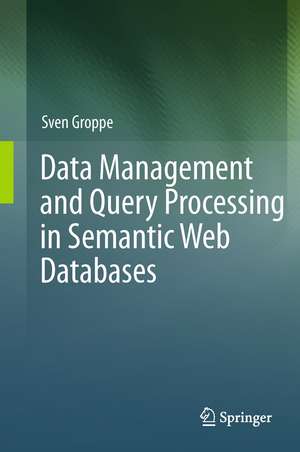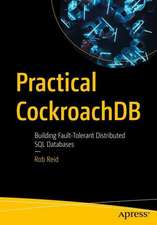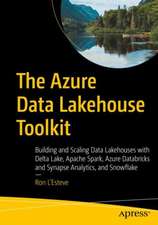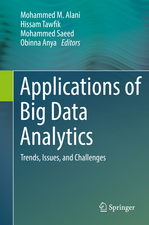Data Management and Query Processing in Semantic Web Databases
Autor Sven Groppeen Limba Engleză Paperback – 8 noi 2014
In his book, Groppe details various aspects of high-performance Semantic Web data management and query processing. His presentation fills the gap between Semantic Web and database books, which either fail to take into account the performance issues of large-scale data management or fail to exploit the special properties of Semantic Web data models and queries. After a general introduction to the relevant Semantic Web standards, he presents specialized indexing and sorting algorithms, adapted approaches for logical and physical query optimization, optimization possibilities when using the parallel database technologies of today’s multicore processors, and visual and embedded query languages.
Groppe primarily targets researchers, students, and developers of large-scale Semantic Web applications. On the complementary book webpage readers will find additional material, such as an online demonstration of a query engine, and exercises, and their solutions, that challenge their comprehension of the topics presented.
| Toate formatele și edițiile | Preț | Express |
|---|---|---|
| Paperback (1) | 331.74 lei 6-8 săpt. | |
| Springer Berlin, Heidelberg – 8 noi 2014 | 331.74 lei 6-8 săpt. | |
| Hardback (1) | 336.21 lei 6-8 săpt. | |
| Springer Berlin, Heidelberg – 6 mai 2011 | 336.21 lei 6-8 săpt. |
Preț: 331.74 lei
Preț vechi: 414.67 lei
-20% Nou
Puncte Express: 498
Preț estimativ în valută:
63.48€ • 67.88$ • 52.93£
63.48€ • 67.88$ • 52.93£
Carte tipărită la comandă
Livrare economică 17 aprilie-01 mai
Preluare comenzi: 021 569.72.76
Specificații
ISBN-13: 9783642435492
ISBN-10: 3642435491
Pagini: 280
Ilustrații: IX, 270 p.
Dimensiuni: 155 x 235 x 15 mm
Greutate: 0.4 kg
Ediția:2011
Editura: Springer Berlin, Heidelberg
Colecția Springer
Locul publicării:Berlin, Heidelberg, Germany
ISBN-10: 3642435491
Pagini: 280
Ilustrații: IX, 270 p.
Dimensiuni: 155 x 235 x 15 mm
Greutate: 0.4 kg
Ediția:2011
Editura: Springer Berlin, Heidelberg
Colecția Springer
Locul publicării:Berlin, Heidelberg, Germany
Public țintă
ResearchCuprins
Introduction.- Semantic Web.- External Sorting and B+-Trees.- Query Processing Overview.- Logical Optimization.- Physical Optimization.- Streams.- Parallel Databases.- Inference.- Visual Query Languages.- Embedded Languages.- Comparson of the XML and Semantic Web Worlds.- Summary, Conclusions and Future Work
Notă biografică
Sven Groppe is a research assistant in the Institute of Information Systems at the University of Lübeck, Germany. He holds a Ph.D. from the University of Paderborn on query reformulation for the XML standards XPath, XSLT and XQuery. He was a member of the DAWG W3C Working Group that developed the W3C standard query language SPARQL. His research focus is on large-scale Semantic Web data management and its application in e-business scenarios.
Textul de pe ultima copertă
The Semantic Web, which is intended to establish a machine-understandable Web, is currently changing from being an emerging trend to a technology used in complex real-world applications. A number of standards and techniques have been developed by the World Wide Web Consortium (W3C), e.g., the Resource Description Framework (RDF), which provides a general method for conceptual descriptions for Web resources, and SPARQL, an RDF querying language. Recent examples of large RDF data with billions of facts include the UniProt comprehensive catalog of protein sequence, function and annotation data, the RDF data extracted from Wikipedia, and Princeton University’s WordNet. Clearly, querying performance has become a key issue for Semantic Web applications.
In his book, Groppe details various aspects of high-performance Semantic Web data management and query processing. His presentation fills the gap between Semantic Web and database books, which either fail to take into account the performance issues of large-scale data management or fail to exploit the special properties of Semantic Web data models and queries. After a general introduction to the relevant Semantic Web standards, he presents specialized indexing and sorting algorithms, adapted approaches for logical and physical query optimization, optimization possibilities when using the parallel database technologies of today’s multicore processors, and visual and embedded query languages.
Groppe primarily targets researchers, students, and developers of large-scale Semantic Web applications. On the complementary book webpage readers will find additional material, such as an online demonstration of a query engine, and exercises, and their solutions, that challenge their comprehension of the topics presented.
In his book, Groppe details various aspects of high-performance Semantic Web data management and query processing. His presentation fills the gap between Semantic Web and database books, which either fail to take into account the performance issues of large-scale data management or fail to exploit the special properties of Semantic Web data models and queries. After a general introduction to the relevant Semantic Web standards, he presents specialized indexing and sorting algorithms, adapted approaches for logical and physical query optimization, optimization possibilities when using the parallel database technologies of today’s multicore processors, and visual and embedded query languages.
Groppe primarily targets researchers, students, and developers of large-scale Semantic Web applications. On the complementary book webpage readers will find additional material, such as an online demonstration of a query engine, and exercises, and their solutions, that challenge their comprehension of the topics presented.
Caracteristici
First book on performance issues for Semantic Web data management Author was a member of the W3C working group that defined the standard query language SPARQL Additional teaching and demonstration material available on author’s book website Includes supplementary material: sn.pub/extras




























